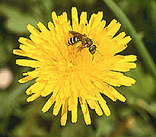Back to: Health Information : Dietary and Herbal Supplements
Dandelion
Keywords: dandelion, lion's tooth, blowball, liver disease
© Scott Bauer, ARS/USDA
On this page
- Introduction
- What It Is Used For
- How It Is Used
- What the Science Says
- Side Effects and Cautions
- Sources
- For More Information
Introduction
This fact sheet provides basic information about dandelion—common names, uses, potential side effects, and resources for more information. Dandelion greens are edible and a rich source of vitamin A. Dandelion has been used in many traditional medical systems, including Native American and traditional Arabic medicine.
Common Names—dandelion, lion's tooth, blowball
Latin Name—Taraxacum officinale
What It Is Used For
- Historically, dandelion was most commonly used to treat liver diseases, kidney diseases, and spleen problems. Less commonly, dandelion was used to treat digestive problems and skin conditions.
- Today, dandelion is used by some as a liver or kidney "tonic," as a diuretic, and for minor digestive problems.
How It Is Used
The leaves and roots of the dandelion, or the whole plant, are used fresh or dried in teas, capsules, or extracts. Dandelion leaves are used in salads or as a cooked green, and the flowers are used to make wine.
What the Science Says
There is no compelling scientific evidence for using dandelion as a treatment for any medical condition.
Side Effects and Cautions
- Dandelion use is generally considered safe. However, there have been rare reports of upset stomach and diarrhea, and some people are allergic to the plant.
- People with an inflamed or infected gallbladder, or blocked bile ducts, should avoid using dandelion.
- Tell your health care providers about any complementary and alternative practices you use. Give them a full picture of what you do to manage your health. This will help ensure coordinated and safe care.
Sources
- Dandelion. Natural Standard Database Web site. Accessed on July 2, 2007.
- Dandelion (Taraxacum officinale). Natural Medicines Comprehensive Database Web site. Accessed on June 28, 2007.
- Dandelion root with herb. In: Blumenthal M, Goldberg A, Brinckman J, eds. Herbal Medicine: Expanded Commission E Monographs. Newton, MA: Lippincott Williams & Wilkins; 2000:359–366.
For More Information
- What's in the Bottle? An Introduction to Dietary Supplements
- Herbal Supplements: Consider Safety, Too
NCCAM Clearinghouse
The NCCAM Clearinghouse provides information on CAM and NCCAM, including publications and searches of Federal databases of scientific and medical literature. The Clearinghouse does not provide medical advice, treatment recommendations, or referrals to practitioners.
Toll-free in the U.S.: 1-888-644-6226
TTY (for deaf and hard-of-hearing callers): 1-866-464-3615
Web site: nccam.nih.gov
E-mail:
CAM on PubMed
Web site: nccam.nih.gov/camonpubmed/
NIH Office of Dietary Supplements
Web site: www.ods.od.nih.gov
NIH National Library of Medicine's MedlinePlus
Dandelion Listing: www.nlm.nih.gov/medlineplus/druginfo/natural/patient-dandelion.html
This publication is not copyrighted and is in the public domain. Duplication is encouraged.
NCCAM has provided this material for your information. It is not intended to substitute for the medical expertise and advice of your primary health care provider. We encourage you to discuss any decisions about treatment or care with your health care provider. The mention of any product, service, or therapy is not an endorsement by NCCAM. |
NCCAM Publication No. D302
Created January 2006
Updated April 2008
Note: The PDF file requires a viewer such as Adobe Reader, which you can download free of charge from the Adobe Web site.
